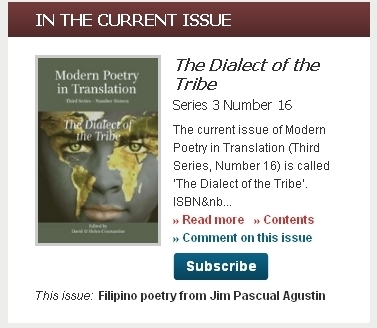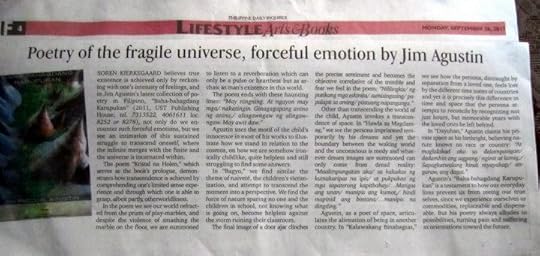Jim Pascual Agustin's Blog, page 48
November 5, 2011
Vampires that do not Fear the Light
Read two articles from the Mail & Guardian online that should scare all those who think international law can protect sovereign countries and their population from a special breed of Vampires.
-o-
Mbeki: We should learn from Libya's experiences
Recent events in Libya should raise alarm bells about the threat to Africa's hard won right to self-determination, former president Thabo Mbeki said on Saturday.
Addressing the Law Society of the Northern Provinces in Sun City, Mbeki said it "seemed obvious" that a few powerful countries were seeking to use the council to pursue their selfish interests.
They were also determined to behave according to the principle and practice that "might is right" and to sideline the principle of self-determination.
"I must state this categorically that those who have sought to manufacture a particular outcome out of the conflict in Libya have propagated a poisonous canard aimed at discrediting African and African Union (AU) opposition to the Libyan debacle."
He said this was done on the basis that the AU and the rest of "us" had been "bought by Colonel Gadaffi with petro-dollars", and felt obliged to defend his continued misrule.
He said all known means of disinformation was being bandied about, included an argument that Gadaffi's Libya had supported the ANC during the apartheid struggle.
"The incontrovertible fact is that during this whole period, Libya did not give the ANC [African National Congress] even one cent, did not train even one of our military combatants and did not supply us with even one bullet…
CLICK HERE TO READ THE REST OF THE ARTICLE.
-o-
West rushes to grab its Libya reward
Britain's new defence secretary, Philip Hammon, announced that British companies should "pack their suitcases" and head to Libya to snap up lucrative reconstruction contracts.
It all sounds disturbingly familiar. Think of the American companies streaming into Iraq to aid the "reconstruction effort" after the invasion. If there was any doubt, this modus operandi may soon define what seems no more than a new form of neocolonialism in the Middle East. American, Nato (or both) armies will destroy your country under the guise of ushering in democracy, and Western companies will assume the lion's share of contracts to build it up again.
And with Libya's National Transitional Council having already announced it would "reward" those countries that were in its corner during the "revolution", it's anyone's guess who will be the biggest of the war profiteers.
Whereas in the past Gaddafi's Libya was only dealing with China, Russia and Italy, the playing field has now been levelled, in a manner of speaking. Though it has portrayed itself as having had only a "back-room" role in toppling Gaddafi, the United States wants to be the number-one oil buyer from Libya, to compensate for its decades of deprivation of Libyan oil. There can be no doubt that in due course we will see that the US will want a far bigger cut of Libyan oil supplies than it is currently letting on.
It will be said in the future that the end justified the means: the removal of a hated dictator who terrorised his own people for four decades. This may be so, and nobody in their right mind could endorse what the colonel did to Libya. But there are some questions to be asked about the selective morality at play here.
CLICK HERE TO READ THE REST OF THE ARTICLE.
-o-
Please proceed to the nearest toilet to throw up. Now pull yourself together and fight the propaganda machine of these Vampires.
Filed under: Africa, Asia, Capitalism's greed, environment, Europe, Fragments and Moments, Imperialism, Influences, Life in a different world, Middle East, North America, politics, Sanaysay / Essays, terrorism Tagged: Africa, Bahrain, contractors, destruction, human rights, Imperialism, intervention, Libya, Moammar Gaddafi, NATO, Saudi Arabia, sovereignty, terrorism, Thabo Mbeki, twilight movies, UK, US, US Bases, vampires, Western military power








November 2, 2011
From William Blum's Anti-Empire Report
One day I'm going to write something about the idiotic SMART POWER bandied around by HAILary CLINGON… err… what's that transmogrified creature's name again????
For now, here's something from William Blum.
-o-
It doesn't matter to them if it's untrue. It's a higher truth.
The New York Times (March 22) observed:
The Los Angeles Times (April 7) added this about the rebels' media operation:
No pro-[Qaddafi] reportage or commentary
No mention of a civil war. (The Libyan people, east and west, are unified in a war against a totalitarian regime.)
No discussion of tribes or tribalism. (There is only one tribe: Libya.)
No references to Al Qaeda or Islamic extremism. (That's [Qaddafi's] propaganda.)
Filed under: Africa, Capitalism's greed, Europe, Fragments and Moments, Imperialism, Influences, Life in a different world, Middle East, North America, politics, terrorism Tagged: Hilary Clinton, Libya, Moammar Gaddafi, NATO, terrorists, US foreign policy, US imperialism, western forces, William Blum




 [image error]
[image error]


October 29, 2011
A line posted in a discussion board some time ago
I write what interests me. What bothers me. What won't let go even if I try to shake it off.
Filed under: Fragments and Moments, Influences, Mga Tula / Poetry, Silly Babble Tagged: Alien to Any Skin, Baha-bahagdang Karupukan, Jim Pascual Agustin





 [image error]
[image error]

October 28, 2011
The Dialect of the Tribe – MODERN POETRY IN TRANSLATION
Four Filipino poems of mine which I translated to English have been published in the most recent issue of Modern Poetry in Translation: The Dialect of the Tribe (Issue 3 Number 16). One of the poems, "Galing Ingglatera" / "From England," appears in Baha-bahagdang Karupukan (UST Publishing House 2011). Two poems are from previous books. "Aso sa Tabi" / "Pet" is from Beneath an Angry Star (Anvil 1992) and "Siglo" / "Century" from Salimbayan (Publikasyong Sipat 1994) while the last one, "Ngayong Gabi" / "This Evening" has never seen print.
I am looking forward to receiving my copy of this amazing anthology in the post. Perhaps I've found a new audience for my work? 
 Here is a snippet from the issue's editorial:
Here is a snippet from the issue's editorial:
A language must evolve or die, all its speakers may contribute to its life. And every speaking voice of a language is unique, every person's speech is an ideolect, every poet's language is as distinguishable as his or her DNA. Translating a poem, you mix your own voice with the poet's. Thus doubly flighted, poems pass over the frontiers like seeds.
Filed under: Africa, Asia, environment, Europe, Fragments and Moments, Imperialism, Influences, Literary News & Articles, poetry, Sanaysay / Essays, Silly Babble, Uncategorized Tagged: Baha-bahagdang Karupukan, David Constantine, Dialect of the Tribe, Filipino poetry, Helen Constantine, Jim Pascual Agustin, Modern Poetry in Translation, Ted Hughes

 [image error]
[image error]





October 24, 2011
Strangling the Whistleblower
From a Guardian Online article:
-o-
WikiLeaks could be driven out of existence by the new year if it is unable to challenge a financial blockade by banks and credit card companies including Visa, MasterCard and PayPal, the website's founder Julian Assange has said.
Announcing a "temporary suspension" of the whistleblowing website's publishing activities, Assange said the site had been deprived of 95% of its revenue by the "dangerous, oppressive and undemocratic" blockade, and now needed to direct its energy purely into "aggressive fundraising" to fight for the organisation's survival.
"This financial blockade is an existential threat to WikiLeaks. If the blockade is not borne down by the end of the year the organisation cannot continue its work," Assange told a news conference in central London.
The announcement is the most open acknowledgement of the site's perilous financial situation since a clutch of financial operators blocked donations in the days after its publication of leaked US embassy cables in November last year.
-o-
The gang of financial institutions – Paypal, Visa, MasterCard, Bank of America, Western Union and Post Finance – that have refused to take donations for Wikileaks since November last year must be laughing in their golden cages.
Disgusting!
[image error]
READ THE GUARDIAN ARTICLE HERE.
Filed under: Africa, Asia, Capitalism's greed, Europe, Fragments and Moments, Imperialism, Influences, Latin America, Middle East, North America, politics, terrorism, The Greater Americas, Uncategorized Tagged: Bank of America, corporate greed, fascist, human rights abuses, Julian Assange, MasterCard, PayPal, political repression, Post Finance, undemocratic, US Embassy cables leaks, Visa, Western Union, Wikileaks








October 22, 2011
Departure 1
I posted the following on my facebook account. Then I thought, hey, I should really put this on my blog. haha. So here.
-o-
I just remembered. I boarded a Singapore Airlines plane on 22 October 1994 – the day after a powerful storm struck Manila. I walked around Ateneo and saw massive acacia trees with their roots pointing skyward, branches and leaves on all the roads. I was trying to say goodbye to whoever I might come across, but not many. Mostly maintenance workers. I said goodbye to Mang Jaime, the caretaker of Colayco Hall. I told him I was leaving for South Africa. He said "Aren't there black people there?" 
-o-
That was my first international flight. I was given shrimp. I remember nearly throwing up as our plane went through one of the last whipping arms of the typhoon that had struck Manila. Lucky me. My ass was being kicked on my way out.
The plane let us off at Singapore Airport. I was terrified to be so alone, and the possibility of missing the connecting flight to Johannesburg and Cape Town. So I went off in search of the next terminal and sat there for four hours. There were half a dozen other Filipinos milling around the spot. It was also their first flight out of the country, to work for at least two years on a contract. I wished them well. They were all headed for Johannesburg.
Filed under: Africa, Asia, Fragments and Moments, Life in a different world, Silly Babble




 [image error]
[image error]


October 17, 2011
Text of Philippine Daily Inquirer review of BAHA-BAHAGDANG KARUPUKAN
The text of the 26 September 2011 review by Gary Devilles which appeared in the Philippine Daily Inquirer is now posted on my personal blog, matangmanok. Click HERE to get to the page.
Filed under: Uncategorized [image error]
 [image error]
[image error]
 [image error]
[image error]
[image error]
[image error]
 [image error]
[image error]
A Fragile World – Philippine Daily Inquirer review of BAHA-BAHAGDANG KARUPUKAN
A Fragile World, a review of Jim Pascual Agustin's Baha-bahagdang Karupukan
by Gary Devilles, 26 September 2011 Philippine Daily Inquirer
Philosopher Soren Kierkegaard believes that true existence is achieved only by reckoning with one's intensity of feelings and in Jim Pascual Agustin's latest collection of poetry in Filipino, Baha-bahagdang Karupukan, not only do we encounter such forceful emotions, but we see an intimation of this sustained struggle to transcend oneself, where the infinite merges with the finite and the universe is incarnated within.
The poem "Kristal na Holen" which serves as the book's prologue demonstrates how such transcendence is achieved by comprehending one's limited sense experience and through which one is able to grasp, albeit partly, this otherworldly moment. In the poem we see our world refracted from the prism of the play marbles and despite the violence of smashing the marble on the floor we are summoned to listen to a reverberation which can only be a pulse or heartbeat and yet as archaic as man's existence in this world. The poem ends with these haunting lines:
May ningning. At ngayon may mga
nakatingin. Ginagagap ang anino ng anino,
alingawngaw ng alingawngaw. May awit daw.
The marble is not just a plaything after all, it is the world as seen from a child's point of view and in this poem our fragmented world becomes suffused with songs and possibilities, experiences are intensified as colors break in thousand hues. Agustin uses the child's innocence motifs in most of his works not just to be romantic but to elucidate on how we stand in relation to the cosmos, on how we are somehow ironically childlike, quite helpless and still struggling to find some answers.
In "Bagyo," we find similar theme of naiveté, the children's victimization, and the attempt to transcend the moment into a perspective. We find the force of nature sparing no one and the children in school, not knowing what is going on, become helpless against the storm ruining their classroom. The final image of an ajar door clinched the precise sentiment and becomes the objective correlative of the tremble and fear we feel in the poem:
nililingkis
ng putik ang mga eskinita
sumisingasing
papalapit sa aming
pintuang napanganga
Agustin as an impassioned poet able to conjure these passionate everyday scenes, is quite adept in handling images and he is also successful in "Kapiling ang Gagambang Agiw," where the world of the child is likened to the world of spiders. As the children play hide and seek, the spider tries to conceal itself by its meticulous weaving of web and in the end what is seemingly an innocent play or game becomes an artifice, an intricate design, and the art of discovery and the mystery of revelation.
Other than transcending the world of the child, Agustin invokes a transcendence of space. In "Hawla sa Magdamag" we see the persona imprisoned temporarily by his dreams and yet the boundary between the waking world and the unconscious is reedy and whatever dream images are summoned can only come from dread reality:
maalimpungatan ako
sa kaluskos ng kumakaripas na ipis
at pukpukan ng mga sapaterong kapitbahay
…Matigas ang unan
manipis ang kumot,
hindi mapinid ang bintana
…manipis na dingding
Agustin as a poet of space articulates the alienation of being in another country. In "Kalawakang Binabagtas" we see how the persona, distraught by separation with his loved one, is lost by the different time zones of countries and yet it is precisely this difference in time and space that the persona attempts to reconcile by recognizing not just hours, but memorable years that have spanned between him and the loved ones he left behind. Agustin has always a sense of scale and what is seemingly small and insignificant takes on a magnitude and the overwhelming scene is dwarfed into a perspective. In "Balita" we see how Agustin crafted "nationness" or the persona's sense of nationhood within five lines of news report and use these very lines to invoke the overpowering image of devastation that happened in his country. Irony is quite strong in Agustin's poems and in "Dayuhan," we see a more assertive persona who claims his private space as his birthright, believing that nature knows no race or country:
At maglalakad ako sa dalampasigan
dadamhin ang sagpang
ng init at lamig.
Sapagkat walang hindi niyayakap
ang araw, ang dagat.
And sometimes even myopia or bigotry is something that persona admits happen in all places even in his own homeland as hinted by the poem "Sa Tuwing May Sisitsit sa Akin." Agustin's Baha-bahagdang Karupukan is a testament on how our everyday lives prevent us from seeing our true selves, where we experience ourselves as commodities, replaceable and dispensable. However, Agustin's poetry always alludes to certain possibilities as we encounter pain and suffering, orientating us towards the future. Our world may be fragile and there would be levels of fragility, but in Jim Pascual Agustin's collection of poetry, underneath or in between these levels of fragility is a space of the real and authentic.
-o-

Filed under: Africa, Asia, Creatures, environment, Fragments and Moments, Influences, Life in a different world, Literary News & Articles, Mga Tula / Poetry, Sanaysay / Essays, Uncategorized Tagged: Alien to Any Skin, Baha-bahagdang Karupukan, book review, Gary Devilles, Jim Pascual Agustin, Philippine Daily Inquirer, UST Publishing House [image error]



 [image error]
[image error]


October 11, 2011
Fueling Cars with Orangutan Blood
That title should capture some attention. So click the image to get the rest of the story
Filed under: Asia, Capitalism's greed, Creatures, environment, Europe, Influences, politics, terrorism, The Greater Americas Tagged: biofuel, ecology, environment, fuel for cars, orangutans, rain forests [image error]







October 8, 2011
Type as You Think
An old teacher of mine used to say that one bestselling author was not a writer, she's a typewriter. Well, that bestselling author probably didn't even have to type her own novels, she dictated them to some underling or three who then had to deal with the mess and turn it into something readable. Of course my teacher was simply jealous of all the money this author was rolling in, boa and all. For he was just an underpaid lecturer. He was writing poetry that was sensitive and well crafted, in other words something that won't sell like hotcakes, in a country that was still finding its footing after decades of dictatorship.
Next to me as I type this is one of my treasured books, John Berger's And Our Faces, My Heart, Brief as Photos. I found it at a charity shop, selling at a ridiculous price — cheaper than a bottle of coke. This book makes me long for home, for people I grew up with, for those who made it clear that words do matter. Somehow.
I sit in my messy room, books and odd bits all thrown together, and hear guinea fowl calls in the dark. Funny creatures, these guinea fowl. During the day they run around chasing each other just for the fun of it, apparently, with no real direction (except "random"), only flying when they get a huge fright from something. But they must get a good kick… haha… those black, skinny legs. More fun than most other creatures, though their brains are no bigger than my baby finger.
Type as you think. Or no thinking at all. This is what happens. haha.
Filed under: Uncategorized




 [image error]
[image error]





